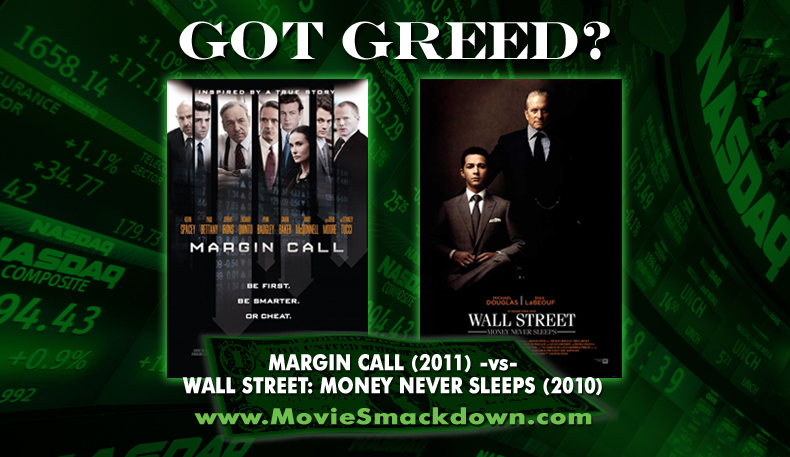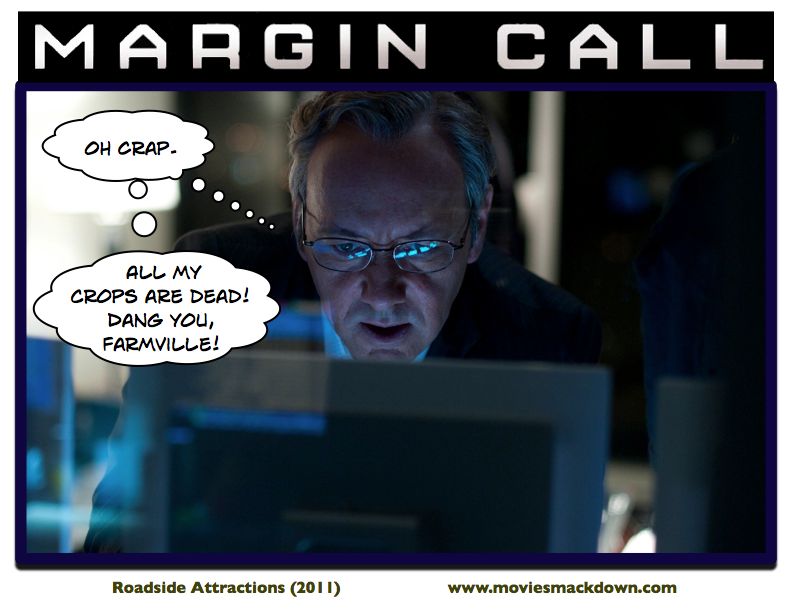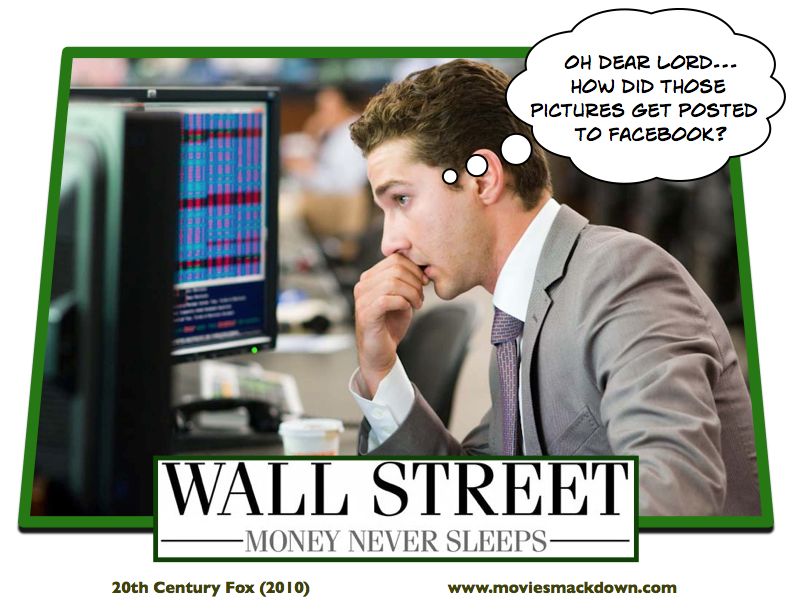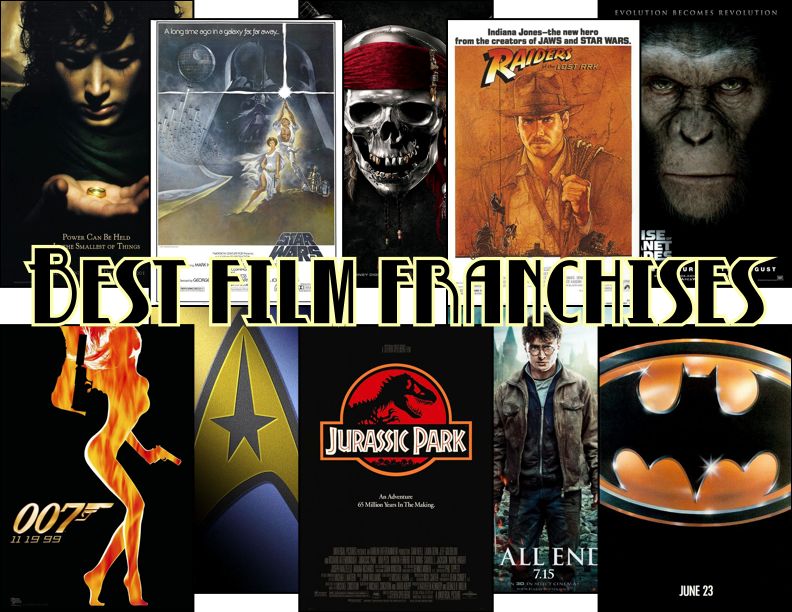
The Smackdown
If you’re one of the 99% who’ve been following the Occupy Wall Street movement with a personal interest that hits a little too close to home, don’t pack your tent and head for City Hall or Zuccotti park until you’ve seen these two new Smackdown rivals: Margin Call, opening this weekend, and Wall Street: Money Never Sleeps, the recent sequel to the classic orignal. In fact, our country’s current beeline toward the financial crapper may explain the visible annoyance I just saw in the audience after the premiere of writer-director J.C. Chandor’s Margin Call. Like any well told story, the film doesn’t cloud our understanding with empty filler showing us “love amid the financial ruins†or David slaying Goliath. The smart money hit the exits in this story before the fix is discovered. If anyone has saintly pretensions here, they are well hidden.
Which is not what you can say about Oliver Stone’s widely seen sequel about financial corruption, Wall Street: Money Never Sleeps. Here, the lizard Gordon Gekko (Michael Douglas) is back, looking undefeated after seven years in prison for insider trading and securities fraud. Gekko has payback in mind, and so does new character Jake Moore (Shia LaBeouf), who has different reasons for seeking revenge.
On paper, this Smack lines up perfectly: strong casts, compelling storylines, different treatment of similar themes. The two films play a real life version of musical chairs: One of them will be holding a bag of toxic assets once the music stops. Let’s check the balance sheet.
The Challenger
It’s 2008, and they’re cutting off heads at an investment firm similar to Lehman Brothers. It’s a supremely depressing moment if you are among the dead and some rent-a-cop escorts you and a pair of boxes of personal effects out the door. (I was escorted out of a building years ago in the TV business at KOIN in Portland, and I can tell you, it’s nothing short of humiliating. I know how the fresh kills in Kevin Spacey’s workplace must feel.) One of the soon-to-be departed is risk-assessment manager Eric Dale (Stanley Tucci, another standout performance). He hands a computer flash drive to junior associate Peter Sullivan (Zachary Quinto) as he gives him the goodbye look. Something he’d been working on, “Be careful,†he warns.
Good advice, because that flash drive contains the real story in Margin Call. It shows the company’s portfolio of worthless mortgage-backed securities and other risky financial instruments may be a day away from meltdown. New calculations are made: Who will survive if they emerge from this crisis of their own making, and who will join the dead? They fear, with good reason, the effects will be global because their game had players around the world. The shock-wave immediately wobbles the firm’s top managers (played superbly by Kevin Spacey, Paul Bettany, Simon Baker and Demi Moore) until it reaches the head reptile, John Tuld (Jeremy Irons). A survival plan emerges with all the formal ceremony of Kabuki theatre. The players know their roles and perform them, knowing in advance that for some of them, it will be their swan song.
The Defending Champion
This Wall Street follow-up script from Allen Loeb and Stephen Schiff portrays Gordon Gekko, on the surface, as a lizard who, emerging from prison, has shed his skin. In fact, he’s a chameleon, changing his appearance to gain some measure of self-serving acceptance. He hits the book-chat circuit, telling everyone who will listen how he shares the perspective of his former victims now, hinting he’s an amateur compared to the high-level manipulators currently in play.
All along, Gekko has his sights set on the former protégé he believes put him in prison, Bretton James (Josh Brolin). James’ activity with the Churchill Schwartz investment house ruins a rival company, Keller Zabel, and leads to the suicide of founder Lou Zabel. This launches Jake Moore — Zabel’s protégé — on a mission of payback. Perhaps too conveniently, Jake (Shia LaBeouf) is engaged to Gekko’s daughter, Winnie (Carey Mulligan). Together, the veteran thief and the one in training set to work.
This story gives what you expect: the New York Skyline, the trading desk, betrayals, double-crosses and good dynamics between Michael Douglas and Shia LaBeouf, even if their film connection seems too pat. We even see Oliver Stone in a cameo, no real surprise there. He ties up the loose ends very tidily.
The Scorecard
I’ll hand this to Oliver Stone: He put great effort into making WS: Money Never Sleeps interesting on several levels. I wonder if he tried too hard. When we see real life crooks like Raj Rajaratnam get 11 years for insider trading, it’s easy to believe in the existence of Gordon Gekko. What strains credulity is the idea he might be in league with the fiancé of his estranged daughter. Or that a rat like Bretton James wouldn’t smell another rat after hiring (!) Jake Moore. There’s also a double-cross of $100-million proportions that Winnie is asked to… what, forgive?
That’s asking a lot and a lesser cast would not have handled these challenges so well. As before, Douglas shows the winning charm and cunning of a practiced killer. LaBeouf and Carey Mulligan look right, even if their presence in the story doesn’t feel that way. The others in the cast are confections: Brolin, Frank Langella, Susan Sarandon (underutilized) and Eli Wallach (perfectly done). This movie even reaches back to briefly include Charlie Sheen, who played Gekko’s protégé Bud Fox in the earlier Wall Street. They are a delight, but don’t elevate the material.
By comparison, Margin Call benefits from the ensemble work giving the story life. The closest thing to humanity is shown by manager Sam Rogers (Spacey) and the junior risk-analyst Peter Sullivan (Quinto, who is one of the film’s producers), but it’s a limited, self-serving concern, as their actions ultimately demonstrate. There’s no love or regard here for co-workers or customers when the Big Decision is made to immediately liquidate the firm’s entire holding of worthless mortgage-backed securities. John Tuld says it all when warned by Rogers this action will cause a financial panic and ruin the market for years to come: “If you’re first out the door, that’s not panicking.†My only quibble comes in the language of the trading desk and the boardroom, which is too clinical. It does the job, but I wish David Mamet had been called in to supply the lacerating, corrosive dialog you just know would have been spoken in the moment.
This cast is exceptional: Spacey, Quinto, Bettany, Tucci, Simon Baker, Demi Moore. This is a remarkable film shot in three weeks on a budget of $3 million.
The Decision
It’s an easy call, and not just marginal: Both rivals offer compelling stories, but you need to scrape away the frosting in WS: Money Never Sleeps to reach the cake. Our winner, Margin Call, honors the story it tells and isn’t hurt by stripping away any embellishments. Inserting such plot devices would have eroded its punch. This is a cautionary tale about the dangers – real and imagined – of leaving our financial fate in the scaly hands of men and women wearing expensive clothing and an extreme sense of entitlement. No matter where you stand politically, you should find a theater showing this small film and occupy it as soon as possible.







I am consistently tempted to see anything involving either Kevin Spacey or Oliver Stone. Having seen WS:MNS and giving it a favorable review, I saw trailers for Margin Call and logged it in my memory, something modestly compelling to maybe see before it hits the tube. I am more intrigued because of your review, as well as your verdict, which reminds me. In the future, it would be nice if, compared to other choices, a movie you review is worth the cost or if it should end up on the trading room floor.
Mark;
You are always a good read and you outdid yourself with this Smackdown. Great references to what’s real & news in today’s economy . . . interspersed with your insights into the story line, writers & actors.
This article has an intensity – feels as though you have an opinion on the financial debacle and you have sunk your teeth into it and are grappling with that . . . interesting.
Are you sure you are not typing this on your iPhone while participating in the Portland Protest?:)
I want to see both of them.